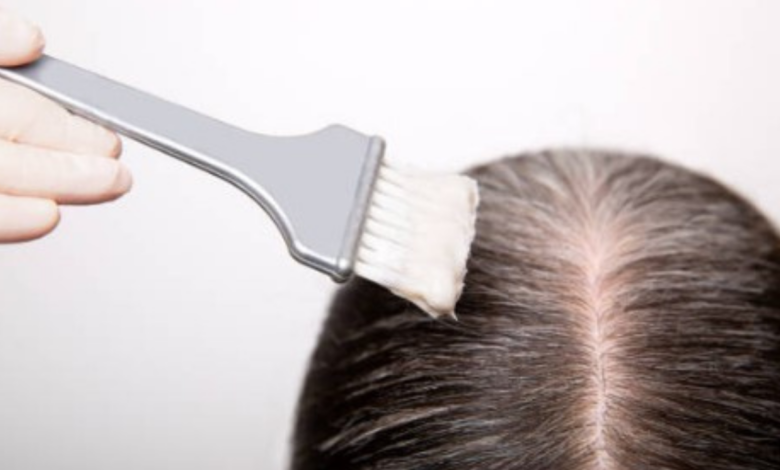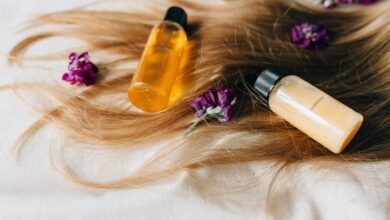Hair Care
Hair Loss or Alopecia

is a problem that many people suffer from, and for some, it can cause embarrassment. What can we do about hair loss? How can we grow new hair? In this article, I will reveal the causes and factors that lead to hair loss and how to prevent it. There is always a disease and a cure—we will explore some natural treatments for hair loss and how to achieve longer, healthier hair.
Causes of Hair Loss:
1. Harmful Chemicals:
- Frequent dyeing with chemical-based products can gradually kill hair follicles, leading to hair loss.
- Hair straightening or curling treatments contain strong chemicals that break hair bonds, weakening the follicles and causing damage.
2. Nutritional Deficiency:
- Nutrition is essential for overall health and especially for hair. A lack of essential vitamins and minerals such as iron, zinc, biotin, and protein can weaken hair and make it more prone to falling out.
- Following a balanced diet rich in these nutrients is necessary to maintain healthy hair growth.
3. Medications:
- Some medications, such as those for high blood pressure, cancer, and depression, can have side effects that include hair loss.
- If you suspect that a medication is causing hair loss, talk to your doctor about possible alternatives.
4. Tight Hairstyles:
- Hairstyles like tightly braided hair can put pressure on hair follicles, leading to damage over time.
5. Hormonal Imbalances:
- Male hormones (androgens) can affect hair follicles, leading to hereditary hair loss in men and women.
- Pregnancy, menopause, and thyroid disorders can cause changes in the hair growth cycle, leading to increased hair loss.
- Stress and high cortisol levels can cause temporary hair shedding (telogen effluvium).
6. Anemia (Iron Deficiency):
- Lack of iron prevents adequate oxygen from reaching hair follicles, leading to weakness and hair loss.
- Causes of anemia include heavy menstrual bleeding or low stomach acid, which reduces iron absorption.
- To treat iron deficiency, you can consume diluted chili pepper water or lemon juice before meals to enhance digestion and iron absorption.
Treatment for Hair Loss & Stimulating Growth:
1. Scalp Massage with Natural Oils:
- A mixture of ½ cup of coconut oil + ½ cup of castor oil + 10 drops of rosemary essential oil.
- Castor oil deeply penetrates the scalp, coconut oil nourishes and fights fungi, and rosemary oil stimulates hair follicles.
- Massage this mixture onto the scalp once a week and leave it for several hours before washing.
2. Using Hibiscus Flower:
- Blend 3-4 hibiscus flowers with coconut oil to make a paste, apply it to the scalp for 30 minutes, then rinse.
3. Avoid Shampoos Containing Sodium Lauryl Sulfate (SLS):
- This chemical creates foam in shampoos but can destroy hair follicles.
- Opt for natural shampoos containing ingredients like aloe vera, rosemary, and tea tree oil.
4. Exercise Regularly:
- Exercise increases blood flow to the scalp, promoting hair growth.
- High-Intensity Interval Training (HIIT) is particularly effective in boosting circulation.
5. Drink Enough Water:
- General rule: 8 cups per 45 kg (99 lbs) of body weight daily to maintain scalp hydration.
6. Follow a Healthy Diet:
- Eat fiber, proteins (legumes, nuts, seeds), and healthy fats (avocado, coconut, olive oil).
- Consume foods rich in B vitamins (biotin) like eggs, leafy greens, and whole grains.
- Include omega-3 fatty acids from fatty fish, flaxseeds, and walnuts to support scalp health.
7. Get Enough Sleep:
- Sleeping 8 hours per day is essential for hormone balance and cell regeneration, improving hair health.
- To enhance sleep: eat a light dinner, dim the lights, listen to calming music, and keep your room ventilated.
What About Restoring Natural Hair Color?
- Genetics play a significant role in graying hair.
- Some people have reported restoring their natural hair color after consuming mineral-rich green drinks, such as:
- Chlorophyll
- Barley grass
- Wheatgrass
- Super greens
- Today’s agricultural soil is depleted of minerals due to intensive farming, so it’s crucial to compensate for deficiencies through diet and supplements.
- Avoid harmful hair habits such as using chemical products and tight hairstyles.
- Focus on proper nutrition, exercise, and scalp massages with natural oils.
- Use natural hair care products and avoid harmful sulfates.
- Stay hydrated and maintain good sleep for better hair health.


